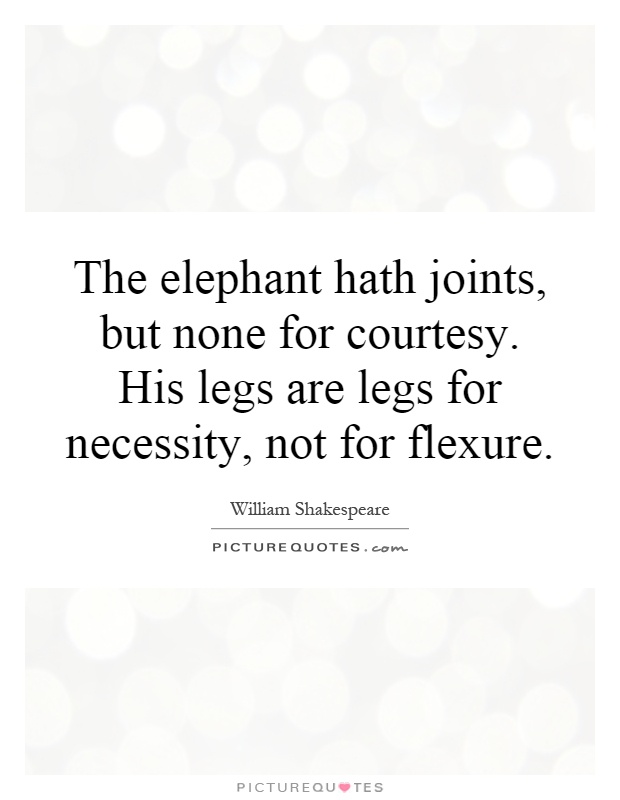The elephant hath joints, but none for courtesy. His legs are legs for necessity, not for flexure

The elephant hath joints, but none for courtesy. His legs are legs for necessity, not for flexure
In William Shakespeare's play "Troilus and Cressida," the character Thersites speaks these lines in Act II, Scene 3, as he criticizes the behavior of the Greek leaders during the Trojan War. The metaphor of the elephant is used to describe the rigid and inflexible nature of these leaders, particularly Agamemnon and Achilles.The elephant is known for its strength and power, but also for its lack of flexibility and grace. Thersites uses this image to highlight the arrogance and lack of courtesy displayed by the Greek leaders. He suggests that they are like elephants in that they are strong and imposing, but lack the ability to bend or adapt to different situations. Their actions are driven by necessity and self-interest, rather than by any sense of courtesy or consideration for others.
Thersites' criticism of the Greek leaders reflects a larger theme in the play, which is the corrupting influence of power and ambition. Throughout "Troilus and Cressida," Shakespeare explores the ways in which individuals are driven by their own desires and ambitions, often at the expense of others. The Greek leaders, in their pursuit of glory and victory, are willing to sacrifice honor and integrity, leading to betrayal and conflict among themselves.
The image of the elephant also serves as a reminder of the destructive nature of war. Elephants were often used as weapons of war in ancient times, and their presence on the battlefield was a terrifying sight. By comparing the Greek leaders to elephants, Thersites emphasizes the brutality and violence of the conflict in which they are engaged.
Overall, Thersites' words highlight the flaws and shortcomings of the Greek leaders in "Troilus and Cressida." The metaphor of the elephant underscores their lack of courtesy and flexibility, as well as the destructive consequences of their actions. Through this imagery, Shakespeare invites the audience to reflect on the nature of power and ambition, and the ways in which they can corrupt and distort human behavior.












 Friendship Quotes
Friendship Quotes Love Quotes
Love Quotes Life Quotes
Life Quotes Funny Quotes
Funny Quotes Motivational Quotes
Motivational Quotes Inspirational Quotes
Inspirational Quotes